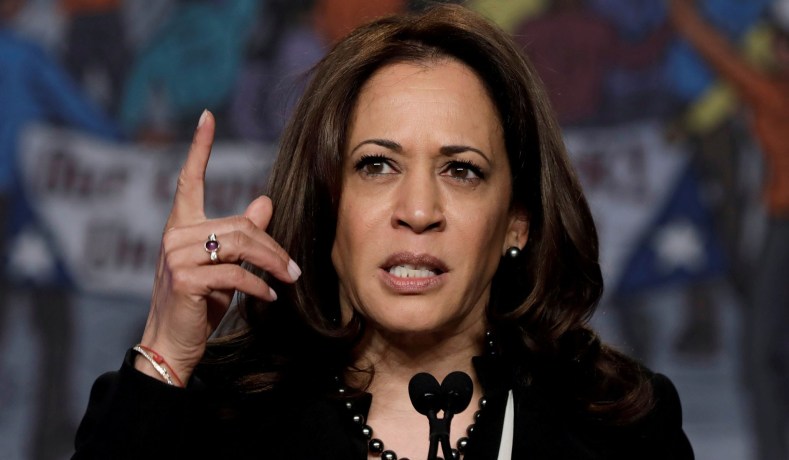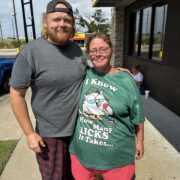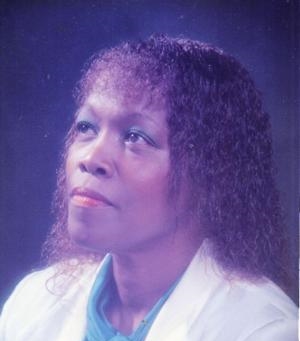
By Eugene Scott
During the Democratic presidential debate, Donald Trump Jr. shared a viral tweet that questions Sen. Kamala D. Harris’s (D-Calif.) ability to address issues of importance to black Americans because she is the daughter of a Jamaican immigrant.
The tweet — which some suspect is from a bot targeting black voters — read: “Kamala Harris is *not* an American Black. She is half Indian and half Jamaican. I’m so sick of people robbing American Blacks (like myself) of our history. It’s disgusting. Now using it for debate time at #DemDebate2? These are my people not her people. Freaking disgusting.”
This is not the first time Harris, who hopes to become America’s first black female president, has had to answer questions about the “legitimacy” of her “blackness.” Below is a post I wrote in February that’s relevant again.
Online, stories have circulated suggesting that the lawmaker is not African American because her parents are immigrants and she spent some of her childhood in Canada. During a February appearance on “The Breakfast Club” radio show, hosts DJ Envy and Charlamagne Tha God asked Harris about that.
Harris pushed back. “I’m black, and I’m proud of being black. I was born black. I will die black,” she said. “I’m not going to make excuses for anybody because they don’t understand.”
She went on to criticize those who question her racial identity.
“I think they don’t understand who black people are,” Harris said. “I’m not going to spend my time trying to educate people about who black people are. Because right now, frankly, I’m focused on, for example, an initiative that I have that is called the LIFT Act that is about lifting folks out of poverty.”
Harris has had life experiences different from those of many black Americans. Her father is a Jamaican immigrant; her mother is a Tamil Indian immigrant. Her husband is a white man from New York. While she was born in Oakland — a city with a rich history of African American activism — Harris spent her early childhood in Berkeley, Calif., and worshiped at a Hindu temple in addition to attending black Baptist services. She attended high school in Montreal before returning to the United States for college at Howard University, a historically black college.
These differences may help explain why some voters want to know more about her background. Some want to know that she understands some of the issues affecting black Americans since the emancipation of slaves. Harris has said that she supports reparations for the descendants of black people who were enslaved in the United States.
But those asking more questions have attempted to explain the intentions behind their inquiries.
“This whole argument that we’re saying she’s not black is really ridiculous,” Yvette Carnell, co-founder of the American Descendants of Slavery movement, told the Philadelphia Inquirer. “We’re saying there is a difference in the justice demands for people who are descendants of slaves in this country and those who were enslaved in Jamaica.”
Carnell fleshed out the argument further Wednesday, tweeting:
“Kamala Harris doesn’t have that in her lineage. She’s anchored in two affluent, immigrant parents. It’s really simple. So since Kamala Harris doesn’t have this experience in her background, or a track record that expresses this understanding, and she announced during MLK Week, at Howard University, of course she’s going to get pressed HARD on the specificity of her #ADOS Agenda.”
(The ADOS, or American Descendants of Slavery, movement seeks to draw attention to the policy issues affecting the lives of blacks who descended from American slaves.)
Days after Harris launched her campaign, Tressie McMillan Cottom, a sociology professor at Virginia Commonwealth University, tweeted a thread on why some voters are asking questions about Harris’s black experience.
“People aren’t wholesale crazy for debating Kamala’s racial solidarity anymore than they debate it with any other candidate,” she wrote. “What I am not going to let people do is pretend that black voters are stupid or wrong for doing what people surely do to us, which is question our bona fides.”
President Barack Obama — the son of a white American mother and a black Kenyan father who came to the United States for college — faced similar questions when he entered the presidential race in 2008. Columnist Stanley Crouch wrote in the New York Daily News:
“When black Americans refer to Obama as ‘one of us,’ I do not know what they are talking about. In his new book, ‘The Audacity of Hope,’ Obama makes it clear that, while he has experienced some light versions of typical racial stereotypes, he cannot claim those problems as his own — nor has he lived the life of a black American.”
And at the end of 2007, then-Sen. Hillary Clinton (D-N.Y.) was viewed more favorably than Obama by African American voters. Politico publisheda survey showing that Clinton was rated favorably by 83 percent of respondents while Obama was rated favorably by 74 percent of African American voters.
It’s so frustrating to watch @KamalaHarris deal with the same bullshit Barack Obama did when he decided to run for President. First people suggested he wasn’t “black enough,” then there were constant doubts about whether an African American could get elected.
As a result, Obama spent significant time during the early part of his campaign highlighting his work in the African American communities of Chicago’s South Side. He highlighted Michelle Obama’s background as the daughter of two black parents who grew up on Chicago’s South Side, surrounded by households run by descendants of black people enslaved in the South. And he also delivered a well-received speech on race just months before the election, laying out his own perspective on race and racism in the United States.
As of now, Harris’s approach has been to dismiss those asking questions and call them divisive.
“This is the same thing they did to Barack,” she said in her “Breakfast Club” interview. “This is not new to us, and so I think that we know what they are trying to do. They are trying to do what has been happening over the last two years, which is powerful voices trying to sow hate and division, and so we need to recognize when we’re being played.”
But that might not be enough. Many voters are still quite unfamiliar with Harris. They want to know if the former prosecutor’s politics on criminal justice and immigration align with one of the most influential voting blocs in the Democratic Party.
With increased spotlight on Harris following her well-received campaign launch, these questions about her ties to the African American community will probably continue, both from those trying to decide whether to support her and from those pro-Trump conservatives who hope to characterize her as a dishonest lawmaker misrepresenting herself for the sake of popularity.
Correction: A previous version of this report misidentified the movement co-founded by Yvette Carnell. It is the American Descendants of Slavery, not the African Descendants of Slavery. This post has been corrected.










